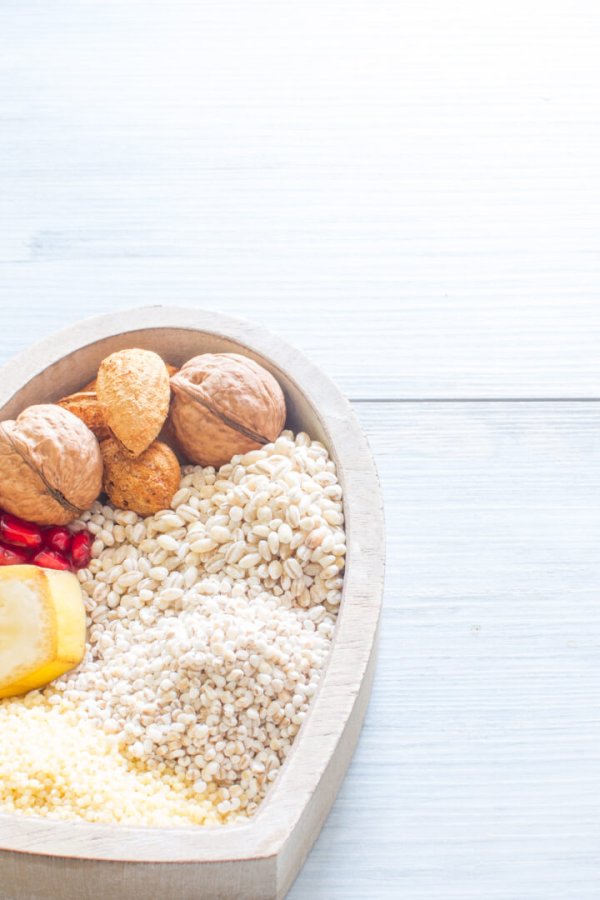Recent research has shown that strict, restrictive diets are not effective in the long term. While various elimination diets and reducing the energy intake may contribute to faster weight loss, the body quickly adapts to such diets and reduces metabolic energy expenditure, so weight loss soon stops, which has a demotivating effect on those who have chosen this type of diet. Moreover, resuming a regular diet after a restrictive one results in an increase in energy intake, and thus a rapid return to the original body weight – popularly known as the yo-yo effect.
In addition, unbalanced nutrition and self-imposed restrictive diets often result in impaired digestive function and digestive problems, which in turn can lead to a disruption in the gut microbiota balance, i.e. dysbiosis. What’s more, as a result of poor and unbalanced diets, as well as factors such as constant stress, lack of sleep, alcohol consumption and inadequate fluid intake, an increasing number of people are suffering from digestive disorders, including both constipation and excessive bowel movements, as well as stomach and intestinal pain, heartburn, abdominal pain, bloating, flatulence, and even irritable bowel syndrome. Digestive problems and impaired gut function are more common in overweight and obese people compared to those with a healthy body weight.
A modern and effective approach to weight loss involves gradual and long-term sustainable lifestyle changes that ensure a healthy and efficient functioning of the gastrointestinal tract and metabolism.
First of all, eating “good food” promotes good digestion, so proper nutrition is the only “right” way to achieve a healthy body weight. However, what constitutes proper nutrition, or what “good food” consists of, is often not adequately explained.
First, let’s define “good food”. The best source of energy and nutrients is natural food, that is, food in its natural form. Fresh vegetables and fruit, legumes, seeds, cereals and wholemeal flours, unprocessed meat, fish and eggs, simple dairy products such as yoghurt, acidophilus milk, kefir and fresh cheeses, and cold-pressed oils (olive, rapeseed, pumpkin, sunflower, sunflower, coconut, etc.) form the basis of a healthy diet. These foods should be the foundation of every meal. Processed foods, especially the more complex ones, contain large amounts of preservatives and other additives that put a heavy burden on the digestive system and interfere with its functioning. That’s why when buying groceries we should focus on fresh, wholesome, unprocessed or minimally processed foods as much as possible. While fresh foods obviously require extra time to prepare, preparing meals that can be consumed over several days is increasingly popular, making it much easier to develop good eating habits. Preparing meals in advance not only reduces the burden of cooking during the week, but also encourages us to actively think about what we eat and plan our meals, providing regular meals without prolonged periods of hunger and overeating, or random purchases of ready-made meals and fast food.
When part of a healthy lifestyle, proper nutrition can have a whole range of positive knock-on effects. It provides a sense of control over what we eat, improves and regulates digestion, and boosts energy and satisfaction. Healthy digestion allows for a better use of nutrients with greater absorption of vitamins and minerals, and thus reduced feelings of hunger and fatigue, all of which contribute to the long-term sustainability of good eating habits.

Fresh fruit and vegetables, legumes and wholegrain cereals are particularly good sources of both soluble and insoluble dietary fibre. Dietary fibre is an essential contributing factor to gastrointestinal health. Insoluble dietary fibre, which is most abundant in legumes and cereals and in fruit and vegetable skins, is important for gastrointestinal motility and keeping stools soft, which ensures proper cleansing of the digestive tract. These foods also contain a high proportion of soluble dietary fibre, in particular pectin, a prebiotic which provides nourishment for the gut microbiota, enabling it to thrive and maintaining digestive balance. A healthy gut microbiota has been shown to have a positive effect on the regeneration of intestinal cells, making the gut less permeable, which in turn benefits the whole body, especially the immune system.
It is a well-known fact that, in addition to being an excellent source of nutrients and water, fruit and vegetables are the best sources of vitamins and minerals, as well as bioactive substances with powerful antioxidant properties. All these substances play an important role in the energy metabolism, as well as in many other metabolic processes, for example in using proteins to build muscle and other tissues and in the oxidation of fatty acids.
Good sources of easily digestible protein are necessary for the development of all tissues, especially muscle, so a healthy diet should include a daily intake of high quality dairy products, fish, eggs and meat, with fish and poultry being preferable to red meat. This is the basis of the Mediterranean diet, which is probably the most studied and healthiest diet.
From a nutritional point of view, fermented dairy products are an excellent source of highly beneficial proteins, as well as probiotic cultures which ferment the milk sugar lactose. Depending on the type of probiotic cultures, there are different fermented dairy products such as probiotic yoghurt, kefir, acidophilus milk and sour milk. These products are of course also rich in calcium, a mineral that is essential for bone formation and the proper functioning of muscles.
When it comes to proper nutrition, herbs are an indispensable part of the menu. As well as enhancing the flavour of any dish, they reduce the need for salting and contribute to the nutritional and healthy properties of the meal. Herbs such as basil, oregano, parsley, thyme, turmeric, ginger, cinnamon and others contain active substances that have specific proven effects, and which work in synergy with other ingredients in a dish.
A healthy diet also includes adequate hydration. The best way to keep hydrated is to drink water, which should be the primary fluid consumed throughout the day. The recommended daily intake of water is 1.5 to 2 litres. Natural mineral water is a source of many electrolytes, such as magnesium, calcium and bicarbonate, which increase water absorption and improve digestion and bowel function. In addition to water, drinking unsweetened herbal teas can also contribute significantly to the intake of bioactive substances that have proven health benefits.
On the other hand, juices and other drinks with added sugar and sweeteners contain high levels of simple sugars and additives that adversely affect the gut microbiota and gut lining, and their daily consumption results in intestinal imbalance and damage to intestinal cells.
It should be quite clear now what constitutes proper nutrition and what is considered “good food”.
“Good food” is genuinely nourishing for the body, supporting normal and healthy digestion, which improves the functioning of the metabolism and the immune system, and this in turn makes it easier and safer to achieve a healthy body weight. Thoughtful planning of your nutrition, combining foods and ensuring adequate fluid intake provide a sustainable and safe pathway to a healthier weight in the long term. Taking care of yourself in this way contributes to better concentration, fitness and everyday performance. This is the way to stay motivated and on track with your nutrition and hydration plan. A modern approach to nutrition, avoiding restrictive diets that further undermine gastrointestinal health and put the body in a state of metabolic confusion and imbalance, is therefore the only safe and viable route to well-being and success.
Choose chapter:






